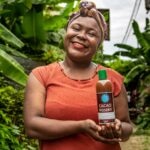Six out of ten vulnerable entrepreneurs escape poverty in five years with support from BBVA Microfinance Foundation
Celia Mosquera has had to reinvent herself three times after being forcibly displaced by violence in Colombia. Her story is one example of the remarkable resilience of micro entrepreneurs supported by the BBVA Microfinance Foundation (BBVAMF): 60 percent of them managed to overcome poverty after five years of assistance and finance from the entities within the foundation.

Altamisa Tradicional, a small natural cosmetics business that is going from strength to strength, may be the initiative that allows Celia Mosquera to leave poverty behind for good. This is the third time that this Colombian woman, who left her hometown fleeing violence, has used her entrepreneurial skills to try to make a better life for herself. This time, she has tried to do so with Bancamía, the Colombian branch of the BBVA Microfinance Foundation (BBVAMF). She took out a loan with which she bought packaging, an oven, an industrial stove to adapt the ancestral formulas of her ancestors... And she also received training in online marketing thanks to the Productive Entrepreneurship for Peace (EMPROPAZ) program of the microfinance institution. Her effort, perseverance and adaptability have made the business thrive and she has even hired other members of her community.
Celia is a prime example of the sheer resilience of the entrepreneurs supported by BBVAMF entities: 60 percent of them have managed to overcome poverty within five years and 15 percent of those who receive funding from the foundation create jobs. BBVAMF has thus made its mark on 9.2 million people in 2022. These are data from the Foundation's latest Social Performance Report, which measures the progress of the three million vulnerable entrepreneurs it currently supports.
Measuring to understand and support entrepreneurs
The people who approach BBVAMF centers with the hope of becoming entrepreneurs mostly live and work in the informal economy out of sheer necessity. To understand their needs and constraints, over 12 years ago BBVAMF developed its own Social Impact Measurement model that enables it to determine the social characteristics of each entrepreneur (gender, level of education, type of housing, etc.), the environment in which they live (rural or urban), the type of business they manage, their relationship with the microfinance institution (amount and duration of the loan, savings, insurance, etc.), their financial health and, most importantly, their progress over time. BBVAMF was also the first private organization to use the Oxford University Multidimensional Poverty Index to measure the deprivation faced by the households of its clients.
The detailed information provided by these metrics, embedded in the 2022 report, enables BBVAMF entities to customize their products and thus maximize each individual's progress. In 2022, the number of entrepreneurs who had some form of insurance cover grew by 62 percent. Farmers like Rumaldo, who grows flowers in the Dominican Republic, are especially vulnerable to severe weather. Many of them do not have insurance to cover the damage it can cause to their crops.
With the support of Banco Adopem, the Foundation's partner in the country, Rumaldo has been able to grow his business and employ 12 more people. He lives in a rural area and an advisor travels to his business with a tablet from which the same transactions can be carried out as in a branch office.
José Romero, a Venezuelan migrant, is an advisor to Financiera Confianza, a Peruvian branch of BBVAMF. In 2022, he became part of the organization's inclusion program for migrants. Thanks to this initiative, he has received training in microfinance and now has a job that helps him support his family: "It's what I was looking for. To have a regular job. It was my dream and I have achieved it thanks to the training I was offered to become a credit counselor. Serving entrepreneurs is very satisfying," he proudly explains.
Digitalization that makes life better for real people
BBVAMF has been committed for years to a digital transformation that allows the service it provides to be easier, faster, more flexible and less costly, thus enabling greater progress for the people it supports and bridging the digital divide.

BBVAMF has trained almost 700,000 entrepreneurs over the past year, such as Edith Elguera, a Chilean entrepreneur who produces and sells honey from the Atacama Desert. Using technology and the Internet, he teaches courses in administrative management, stock control and accounting. He logs in to the free online training platform and the Entrepreneurship School that Fondo Esperanza, a Chilean entity of the BBVA Microfinance Foundation, makes available to the more than 112,000 entrepreneurs it supports.
As the 2022 Performance Report points out, there are still 70 million women in Latin America and the Caribbean who do not use the Internet on their cell phones, with a significant gender digital divide. Promoting the autonomy of women, who represent 57 percent of the total number of people assisted, is a priority for BBVAMF. In addition, women start out with fewer resources for entrepreneurship: 46 percent of women borrowing for the first time are poor, compared to 29 percent of men.
Bridging gaps, creating opportunities:
However, there is still a long way to go. Faced with this challenge, BBVAMF is committed to disburse more than €7 billion in financing to 4.5 million low-income entrepreneurs over the period 2021-2025. By relying on digital solutions, providing development programs in financial and digital skills, Internet access and transactional services, the Foundation expects to impact 14 million people in Latin America. In 2022 the Foundation disbursed 1,164,187 loans and since its inception has supported more than 6 million low-income entrepreneurs with more than USD 18 billion in funding.